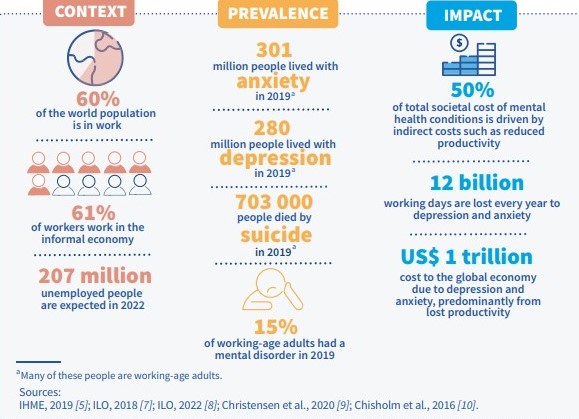A WHO/ILO joint policy brief calls for global action to address mental health at work. The brief illustrates practical strategies for governments, employers, workers, and their organizations in the public and private sectors.
The report focuses on the prevention of psychosocial risks, protection and promotion of mental health and support of workers with mental health conditions, so they can participate and thrive in the world of work.
As it says, an estimated 12 billion workdays are lost annually due to depression and anxiety costing the global economy nearly US$ one trillion. WHO’s global guidelines on mental health at work recommend actions to tackle risks to mental health such as heavy workloads, negative behaviours and other factors that create distress at work. For the first time WHO recommends manager training, to build their capacity to prevent stressful work environments and respond to workers in distress.
It’s time to focus on the detrimental effect work can have on our mental health. The well-being of the individual is reason enough to act, but poor mental health can also have a debilitating impact on a person’s performance and productivity
said Dr Tedros Adhanom Ghebreyesus, WHO Director-General.
 The need for action
The need for action
Effective policies and action to improve mental health at work are critical to uphold the human right to good health, including mental health, and to advance progress towards the Sustainable Development Goals (SDGs), especially SDG 3 on health and SDG 8 on decent work for all.
For individuals and households, better mental health at work can reduce exclusion, improve overall health and well-being and increase economic security. Enterprises also stand to benefit through greater participation in the labour market and higher productivity, both of which improve a company’s bottom line. For governments too, addressing mental health at work can lead to savings in health care expenditure and welfare support.
The costs to society of inaction are significant. Making mental (or physical) health care available comes at a cost. However, the indirect costs of reduced productivity (which can include premature death, disability and reduced productivity while at work) often far outstrip the direct costs of care.
Improving mental health at work requires action to prevent work-related mental health conditions, to protect and promote mental health at work, and to support all workers to participate in work fully and equitable. Each area of action has limited value on its own and works best when implemented alongside the others as part of a broad and comprehensive approach.
Stakeholders in the world of work can help to create an enabling environment for change by securing commitment and funds, tackling stigma and discrimination, coordinating multisectoral and participatory approaches and strengthening the evidence for effective interventions.
Strategies to address mental health health at work
#1 Prevent: Reshape work environments to minimize psychosocial risks and prevent workers from experiencing mental health conditions.
#2 Protect and promote: Strengthen awareness, skills and opportunities for recognizing and acting early on mental health issues to protect and promote the mental health of all workers.
#3 Support: Support workers with mental health conditions to access, continue working and thrive at work.
Individual interventions
Individual interventions in the workplace are delivered straight to a worker who then completes them, with or without guidance from a competent practitioner. They include psychosocial interventions and opportunities for leisure-based physical activity.
Psychosocial interventions use interpersonal or informational activities, techniques or strategies to build skills in stress management and reduce mental health symptoms. Examples include psychoeducation, stress management training (including relaxation training and mindfulness), and emotional or practical social support. Evidence shows that these interventions can help promote positive mental health, reduce emotional distress and improve work effectiveness.
Stress management interventions, including digital self-help tools, are a popular choice for employers because they can be easily delivered to a workforce if there are resources to do so. However, they should only be delivered as part of a broader programme of activities that also includes other interventions that prevent, protect and promote and support mental health at work. This is because a focus on individual stress management is unlikely to be effective on its own; critically, it can wrongly make people feel it is their own fault for experiencing understandable stress in response to difficult work circumstances.
It is important that employers check and verify the quality and effectiveness of any intervention before using it by consulting with experts. Many digital applications are available for mental health self-help and only a few have been well tested and evaluated.
Workers with mental health conditions should also be offered access to (but not obliged to have) evidence-based psychological treatment, preferably outside the workplace. This may include behavioural activation, problem-solving therapy, cognitive behavioural therapy or interpersonal therapy. Any provider of psychological treatments must be appropriately accredited and subject to clinical supervision.






























































